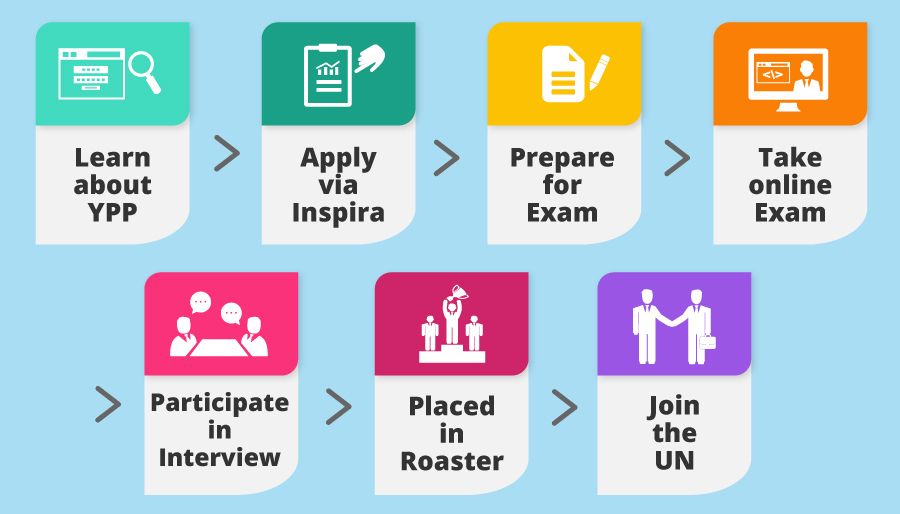As previously mentioned, the UN YPP examination is an annual event and candidates must meet the basic eligibility criteria of the current year, in order to apply. The basic requirements are:
UN YPP Age Limit
You must be 32 years old or younger in the year of the examination. The minimum age, in order to be eligible to apply, is 18 years old.
Please bear in mind, there are no exceptions to the UN YPP age requirement. If you do not meet this basic criterion, you could still look for more senior positions within the UN system that have different age prerequisites.
Language
Fluency in all four areas (speaking, writing, reading and understanding) of English OR French is required. If you indicate anything less than “Fluent” in any of these areas during the application process, you will be automatically considered unqualified. All the examination process tests will be available in both languages. Knowledge of another UN official language (Arabic, Chinese, Russian and/or Spanish) is an advantage.
Nationality
One of the constantly changing criteria and that should be analyzed as a priority, is with regards to the “participating countries” – which defines, based on a quota system (aiming to ensure diversity within the UN Secretariat workforce), which countries are invited to participate in the selection that year. The list changes on an annual basis and, in order to apply, candidates must hold the nationality of a minimum of one of the pre-selected member states.
You can only apply for the UN YPP exams under one nationality. If you have more than one, deciding which one to use may benefit you in the process. For instance, if you take into consideration, which country (of the ones you are a national) is under-represented in the UN Secretariat, or the number of nationals applying for the program, you could improve your chances of qualifying in the exam. This is an important strategy, considering that of all the applicants, only the best 60 per country, for each area, are invited for the first part of the UN YPP written exam.
Please note that prospective nationality and residency status does NOT qualify as nationality for application to the UN YPP exams. You must prove your nationality by presenting a passport or national identity card.
Education
As a minimum, you must hold a first-level university degree (Bachelor’s degree or an equivalent degree of a minimum of three years) relevant for the exam area you are applying for.
This means that a candidate’s academic qualifications should be in areas co-related/covered by the UN YPP exam areas for that year and which they intend to apply for.
For 2019, for example, in order to be eligible, education-wise for the exam in the “Economic Affairs” area, candidates were required to have an undergraduate degree in one of the following areas, as a minimum:
Sociology, Economics, Statistics, Mathematics, Demography, Public Administration, Governance, Political Science, Business Administration, Law, Public Finance, and other social sciences or related fields
PAY ATTENTION: When you prepare your application in Inspira, if you don’t see your exact degree listed, choose the Field of Study that is closest to your degree, from the “Field of Study” and “Main Course of Study” dropdown menus; then type the exact title in the original language as well as its translation in English or French in the additional comment boxes. Do NOT select “other” for Main Course of Study or Field of Study, or you will be automatically disqualified. These details matter, that’s why we recommend that you have your UN YPP application documents reviewed!
Work Experience
Previous professional experience is not required. However, relevant work experience will be used to rank candidates, especially if there are more than 60 from the same country applying for the UN Young Professionals Programme. The UN advises applicants to be precise and succinct about their work experience, using short bullet points to describe the main duties of each role performed.
As you can see, apart from the annual changes on the list of participating countries, the basic requirements remain the same:
Basic criteria for UN Staff Members
Staff members can apply either through an external application (meeting the requirements listed above) or in line with special staff criteria. According to the United Nations, if you are a staff member of the organization in the General Service and related staff categories, or in the Field Service category, and do not meet the above criteria, you can still participate in the examination, if you meet the following prerequisites:
- You have a minimum of five years’ continuous Secretariat experience;
- You have had a completely successful performance in your last two performance appraisals;
- You have a United Nations appointment valid until at least six months after the examination date;
- You meet the minimum educational criteria for the job family you are interested in applying for.



